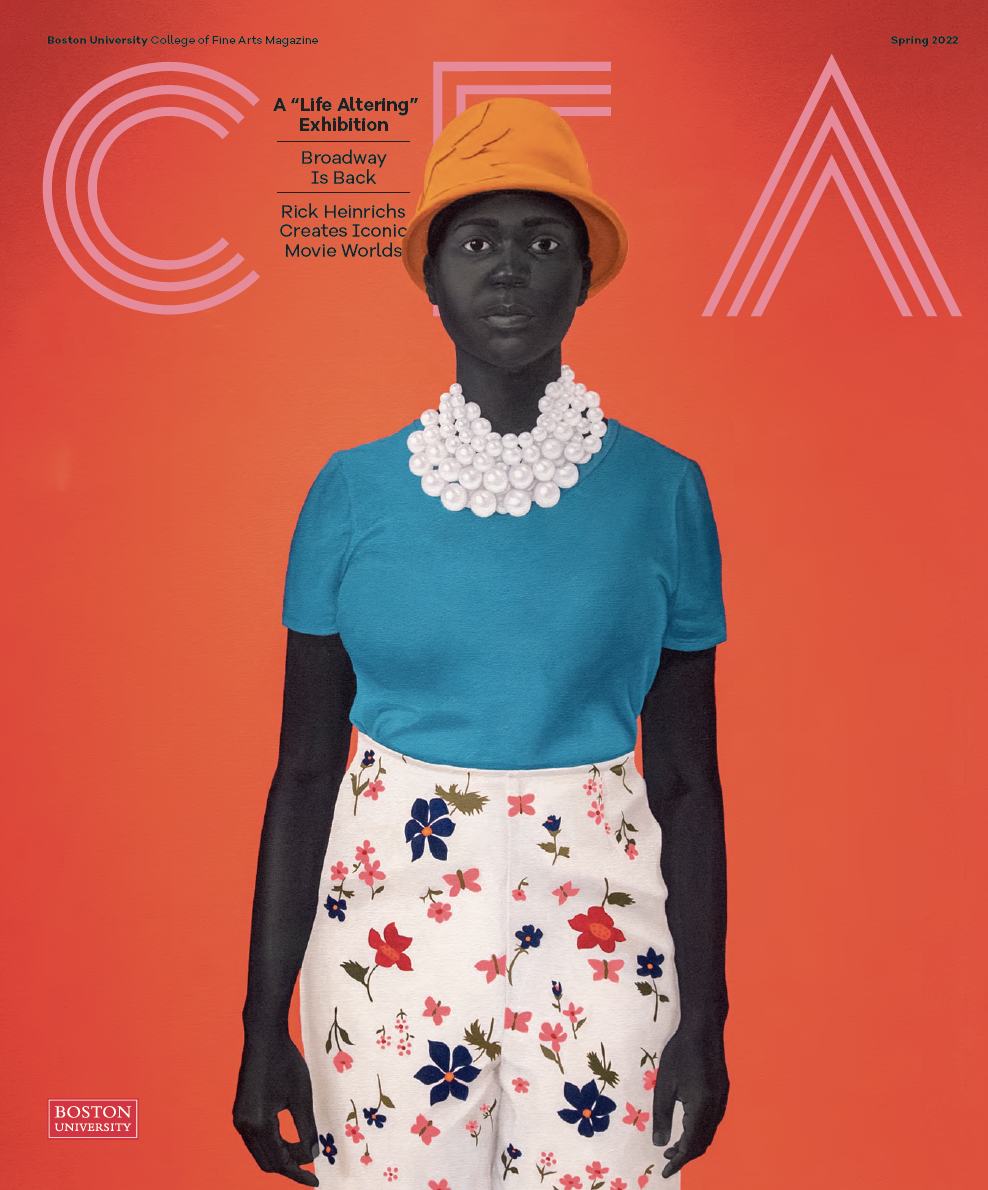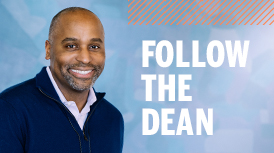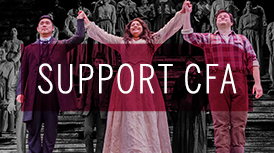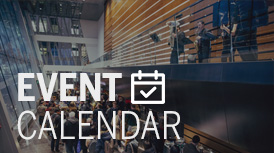Artist at Work: No Strings Attached
He’s created a chamber orchestra, worked with Madonna, and recorded for House of Cards. Versatility is this freelance violinist’s calling card.
By Julie Butters | Photo by Ken Scott
Banner image: In 2015, Mark Robertson (’92) recorded for the soundtrack of the action comedy Ride Along 2.
It’s almost battle time. The world championship finals of League of Legends, the online multiplayer battle game, are about to begin in Sangam Stadium in Seoul, South Korea. As 40,000 spectators cheer, a digital clock projected on a huge screen counts down the last 10 seconds before opening ceremonies. On a sprawling stage, dancing drummers in traditional robes beat their instruments as the alt-rock band Imagine Dragons growls to life. On the stadium floor, Mark Robertson (’92) draws his bow across his violin. He and his fellow orchestra members are accompanying the band’s performance of “Warriors,” the championship theme song. Two teams of finalists will soon compete at computer stations onstage—their performance projected on the stadium screens and broadcast to 27 million viewers on TV and online—for glory and the winner’s cup.
The 2014 League of Legends championship is one of Robertson’s many gigs as a performer, studio musician, and orchestra contractor in Los Angeles. While his primary occupation is a violinist, he’s spent much of his career learning “how to not only expand work opportunities, but learn all the different kinds of ways you can make a living out of being a musician,” whether that’s playing for film and TV or conducting at rock concerts. “I’m always trying to diversify.”
From chamber music to House of Cards
With a classical pianist father and a mother who studied classical singing, Robertson and his sister—now a violinist in the Cincinnati Symphony Orchestra—grew up immersed in music in Fort Wayne, Indiana. Robertson began playing violin at age five and spent his teenage summers as a student at the Aspen Music Festival and School. He studied violin at CFA under the legendary Roman Totenberg, the late School of Music professor emeritus, and received a master’s degree from The Juilliard School, then moved to Los Angeles. While subbing in the Los Angeles Philharmonic, he says, he met studio musicians who helped him get auditions for film and TV work. Within a few years, he was performing on scores for Hollywood legends such as Jerry Goldsmith, John Williams, and Alan Silvestri.

Robertson, who records for the Netflix show House of Cards, says orchestral TV scoring has “grown by leaps and bounds in the last 12 to 15 years.” Photo courtesy of Vince Bucci/Invision for the Television Academy AP Images
Since then, Robertson has racked up hundreds of credits in TV shows, video games, and movies. He’s performed violin on soundtracks for Jurassic World, The Incredibles, and The Fast and the Furious franchise and also served as concertmaster on League of Legends and House of Cards. “Netflix releases all the episodes at once,” he says, “so in a 3- to 4-month period we’ll record 13 episodes, and then 6 months later the show comes out. It’s great to hear yourself in the orchestra after it’s been mixed with the dialogue, and to know the composer is happy.”
House of Cards is one example of a trend Robertson observes in the industry: orchestral TV scoring has “grown by leaps and bounds in the last 12 to 15 years.” As synthesizers and samplers became more available in the 1980s, the TV industry began experimenting with digitized music. By the 1990s, most shows used only a few live instruments as supplements; some often relied on loops of electronic sounds. Synthesized music can be cost-saving and trendy, according to industry experts, but it can’t match the fresh, heartfelt sound of live instruments. Today, melodies and organic sound are making a comeback. “Lots of shows have live musicians and live orchestras,” says Robertson.
Rocking at Coachella, recording with Madonna
Today, melodies and organic sound are making a comeback in TV. “Lots of shows have live musicians and live orchestras.” —Mark Robertson
As a freelance musician, Robertson has collaborated with some of the biggest names in the music business. He conducted the orchestra that accompanied the Wu-Tang Clan in concert at the 2015 Coachella music festival in California and performed on albums for artists including Madonna, the Pet Shop Boys, Billy Childs, Avril Lavigne, and Kelly Clarkson. When recording albums, most singers are not in the studio with the musicians. “By the time these sessions happen, [the singers] have already heard mock-ups and there isn’t a lot of rewriting to do,” Robertson says; it’s mostly about fine-tuning elements like balance and articulation. But Madonna and Lavigne were hands on. Lavigne spent a whole day with the musicians who were recording Under My Skin, and Madonna spoke with Robertson when he and other musicians were recording “Messiah” for Rebel Heart. “I was certainly nervous meeting Madonna,” he says, but “she was very positive and helpful with her ideas” for how she wanted the strings to sound.
While he finds it exciting to work with music legends in the studio, Robertson also enjoys projects with social messages—such as the documentaries I’ll Be Me, the 2014 Oscar-nominated film about country musician Glen Campbell’s struggles with Alzheimer’s; The True Cost, about the social impact of the modern clothing industry; and Blackfish, about the captivity of killer whales. “I’m very proud of those projects,” he says.
But even a career as wide-ranging and busy as Robertson’s has its uncertainties. The biggest challenge, he says, is not knowing when the next job is coming and trying to budget despite an unpredictable income. Staying in the game requires “forging relationships, keeping relationships, and playing well—backing up everything well with what you can say you can do.” He advises aspiring young studio musicians to “play concerts and solo recitals, audition for competitions and orchestras, and win or make the finals” to prove their skills and get an edge on the competition.
Around 2006, Robertson expanded his industry knowledge and career options by taking a couple of years off from studio work to learn about what goes on behind the scenes, such as contracting and budgets. He and cellist David Low now use those skills as founders of Allegro Entertainment, which contracts musicians for projects including the 2015 Kia Super Bowl commercial starring Pierce Brosnan and a live performance of The Godfather score that accompanied a presentation of the film at the Nokia Theater in Los Angeles.
Robertson also employs other musicians. He and his partner, trombonist and orchestra conductor Noah Gladstone, created the 47-piece, for-profit Hollywood Chamber Orchestra in 2015 to bring more live concerts to the Los Angeles area, targeting 18- to 49-year-olds with popular offerings such as video game and movie music. Robertson and Gladstone will try to accomplish much in the orchestra’s infancy: produce, program, and fundraise—and commission new works.
“I think it’s important for businesses in the 21st century to adapt to the changing taste of concertgoers.” —Mark Robertson
“I think it’s important for businesses in the 21st century to adapt to the changing taste of concertgoers,” Robertson says. “Expanding the demographic is important as well. People who are younger might want to go see something different than somebody older. Why not try and get these people interested in going to the orchestra so they’ll see a mix of both classical and popular music?”
Interested in all angles of the Hollywood industry, Robertson makes time to produce and fundraise for short films involving other BU alums, and he recently joined the Screen Actors Guild and the Television Academy. “There are lots of different opportunities here and people to meet wherever you go,” he says. “And they all need music.”










